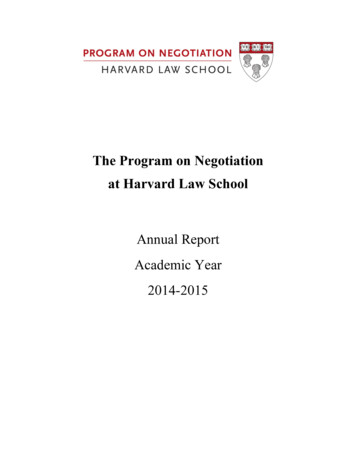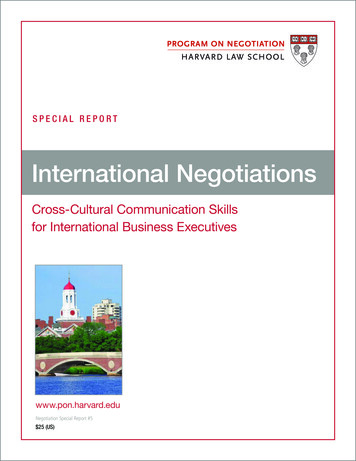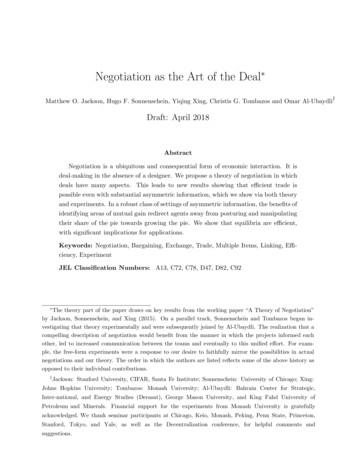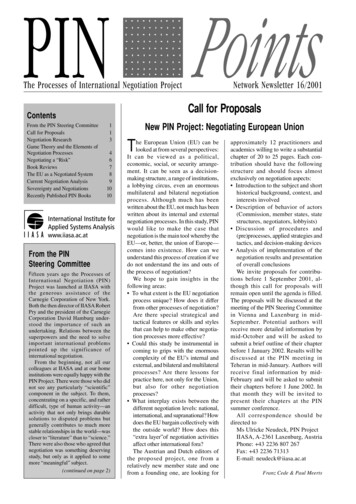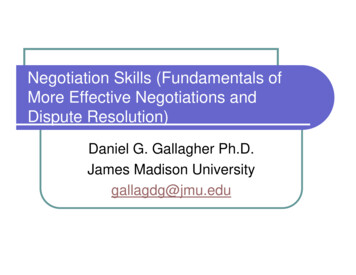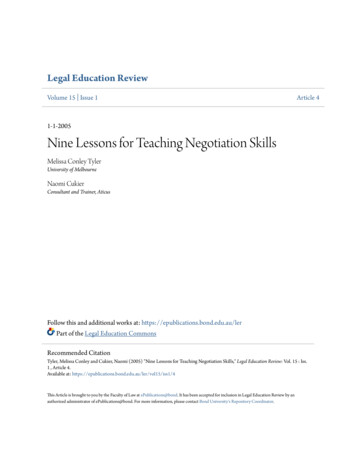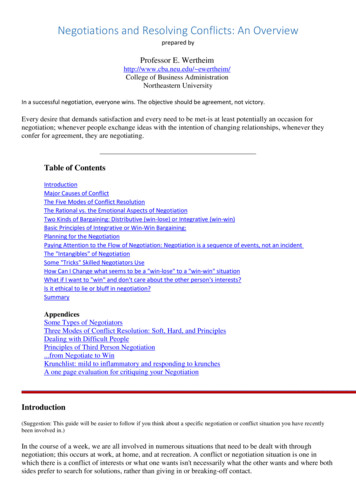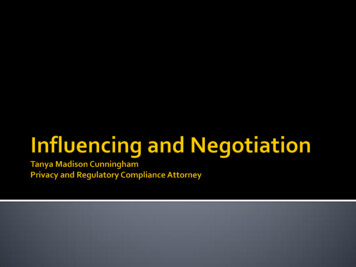
Transcription
What is a negotiation and what are the basic types? How to prepare for a negotiation What is a BATNA? Common mistakes in negotiations Common barriers to negotiations The role of emotion in negotiations Attributes of an effective negotiator Summary
Soft/ Friendly: negotiationwith a focus on peacekeeping Hard/Positional: adversarialwith a focus on “winning” Principled: Separates people from theNegotiation is the means bywhich people deal with theirdifferences. Harvard Business Essentials: Negotiationsproblem Focuses on interests notpositions Uses objective criteria tojudge a proposed solution Invents options for mutualgainFrom Getting To Yes: Negotiating Agreement Without Giving Inby Roger Fisher and William Ury
“Best Alternative to a Negotiated Agreement”List your alternativesEvaluate your alternativesEstablish your BATNAHave a Reservation Point – the least you will acceptList their alternatives – their BATNA and Reservation PointFrom Getting To Yes: Negotiating Agreement Without Giving In by Roger Fisher and William Ury
OneEvaluate your own negotiating styleTwoList your goalsThreeList your expectationsFourConsider the relationshipsFiveCalculate your leverageFrom Harvard Business Essentials - Negotiation by Harvard Business School Press
OneEvaluate their negotiating styleAssess these elementsfor the other partyTwoList their goalsThreeList their expectationsFourConsider how they view relationshipsFiveCalculate their leverageFrom Harvard Business Essentials - Negotiation by Harvard Business School Press
“Best Alternative to a Negotiated Agreement”Google themRead industry publicationsReview annual reports or public filingsAsk your contactsMeet the other side in advancePut yourself in their shoesFrom Harvard Business Essentials - Negotiation by Harvard Business School Press
Assuming shared values or goals Assuming similarcommunication styles orpreferences Expecting reciprocity or yourversion of fair Avoiding conflict Making the negotiationpersonal Trying to prove how smart or“right” you are by talking Not listening carefullyFrom Harvard Business Essentials - Negotiation by Harvard Business School Press
What barriers to negotiations have youexperienced?
Lack of trust Irrational expectations Partisan mindset Spoilers Not listening carefully Overconfidence,irrationality, ego andemotionFrom Harvard Business Essentials - Negotiation by Harvard Business School Press
Absence of key decisionmakers Differing levels ofurgency/timing Lack of informationFrom Harvard Business Essentials - Negotiation by Harvard Business School Press
Identify those withsomething to lose Explain why Emphasize the benefits Find them a new way toexercise control orcontribute Build a coalitionFrom Harvard Business Essentials - Negotiation by Harvard Business School Press
Negative Infuses tension and distrust Limits communication andincreases confrontation Creates fear of losing/beingtaken advantage of Fosters “my way or thehighway” thinking Limits agreement oragreements tend to beunworkableFrom Beyond Reason - Using Emotions as You Negotiate by Roger Fisher and Daniel Shapiro
Positive Builds trust Improves communication Fosters a sense offairness Support for finalagreement Creates investment inpositive outcomeFrom Beyond Reason - Using Emotions as You Negotiate by Roger Fisher and Daniel Shapiro
AppreciationWere you understood and valued?AffiliationWere you treated as a colleague or an adversary?AutonomyWas yours recognized?StatusWas your status respected? Once you answer thesequestions for yourself, askyourself how the other sidewould answer these as well. What role did you play inhow they might respond? What could you do toimpact their answers?RoleWere you satisfied with yours?From Beyond Reason - Using Emotions as You Negotiate by Roger Fisher and Daniel Shapiro
1 Novice to 5 ConfidentRate Your Negotiation Effectiveness1Aligns negotiation goals with organization’s goalsPrepares thoroughlyUses negotiation as a chance to learnDemonstrates flexibilityThinks creativelySeparates personal from the negotiationForesees potential barriers to an agreementForms coalitionsDevelops a reputation of trustworthiness and reliabilityLearns from prior negotiationsSubtotalTotalFrom Harvard Business Essentials - Negotiation by Harvard Business School Press2345
40-50 Prepare your BATNAand commence negotiations 30-39 Enter into negotiationswith a colleague whocomplements your soft skills 20-29 Seek a mentor tofurther develop yournegotiation skills 0-19 Begin developing yournegotiation skills with afriendly audiences with lowstakes
1. Take notes2. Focus3. Don’t think aboutyour response whilethe person is speaking4. Notice body language5. Ask questions6. Repeat back what youunderstand in yourown words
OnePreparation1.How did youprepare?2.What happenedin the negotiation?3.What did you learn andwhat was the outcome?4.What went well andwhat would you dodifferently?TwoNegotiationThreeReview of outcomes and informationFourEvaluationFrom Harvard Business Essentials - Negotiation by Harvard Business School Press
Do your homework – preparation is keyKnow your BATNABe creative and flexibleListen more. Talk less.Separate the personal from the negotiationand recognize the role of emotionConduct a post mortem – gain the benefit ofyour negotiation experience
Recommended Reading Harvard Business Essentials: Negotiations byHarvard Business School Press Harvard Business Essentials: Power, Influenceand Persuasion by Harvard Business School Press Getting To Yes: Negotiating Agreement WithoutGiving In by Roger Fisher and William Ury A Whack on the Side of the Head: How You CanBe More Creative by Roger von Oech Beyond Reason: Using Emotions As YouNegotiate by Roger Fisher and Daniel Shapiro Bargaining for Advantage: NegotiationStrategies for Reasonable People by G. RichardShell Negotiation Strategies – by Damona Doyle andRoss O. Love Division of Agricultural Sciences andNatural Resources at Oklahoma State University
Recommended Reading Harvard Business Essentials: Negotiations by Harvard Business School Press Harvard Business Essentials: Power, Influence and Persuasion by Harvard Business School Press Getting To Yes: Negotiating Agreement Without Giving In by Roger Fisher and William Ury A Whack on the Side of the Head: How You Can Be More Creative by Roger von Oech

